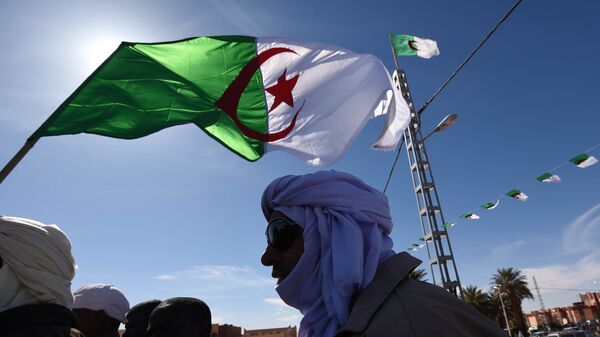An Algerian lawmaker has proposed a bill that would prohibit promoting the normalization of ties with Israel in Algerian media. The move comes after neighbor Morocco became the latest Arab nation to agree to a peace deal with Israel earlier this month - a trend Algiers has denounced.
On Sunday, Amira Selim, a member of the Algerian Parliament from the Democratic National Rally party, announced her intention to introduce the bill.
“This law is based on the positions of the Algerian state that rejects normalization with the Zionist entity, especially since normalization seriously affected the issue of Western Sahara through political bargaining, with commercial justifications and suspicious deals,” Selim wrote on Facebook. “Because this normalization has begun to spread a social split around it due to anonymous opinions and the spread of false news, especially on social media platforms, it is necessary to protect the Algerian citizen and enlighten the public opinion that this issue falls within the circle of prohibitions, and it affects Algerian unchangeable positions towards the Palestinian issue”.
Selim explained that she aims to prevent debates that “would lead to deep ideological differences,” threatening “the public order and the stability of the state and society.”
Stability has long been a concern of the Algerian government, which barely survived a catastrophic civil war from 1991 to 2002 that killed an estimated 200,000 Algerians. For example, former Algerian President Abdelaziz Bouteflika, who resigned in April 2019 amid mass protests, had ruled since 1999.
As other Arab nations have agreed to US-brokered peace deals with Israel over the past few months, Algiers has firmly voiced its opposition and pledged to uphold the 1967 Khartoum Resolution. Also called the “three nos,” Arab League members promised in the wake of the disastrous 1967 Six-Day War with Israel not to make peace with, recognize or negotiate with Israel, which had just seized the Sinai Peninsula from Egypt, West Bank from Jordan, and Golan Heights from Syria.
When the United Arab Emirates announced its peace deal with Israel in August, Algerian President Abdelmadjid Tebboune unequivocally stated Algeria “will not participate in it,” accept it or bless it.
“The Palestine cause is sacred, and we will not give it up,” he added, calling it “the mother of all issues in the Middle East."
More recently, after Rabat signed its own deal with Jerusalem earlier this month, Algerian Prime Minister Abdelaziz Djerad warned the move would further destabilize the region.
“Foreign operations are taking place outside our borders with the aim of destabilizing Algeria,” Djerad said, according to La Patrie, adding that Algerians would unite to “face the multiple dangers that threaten our country.”
As Sputnik reported, the Moroccan monarchy was only convinced to recognize Israeli sovereignty over the Palestinian territories by the Trump administration’s agreement to recognize Morocco’s claims of sovereignty over Western Sahara, a territory it has occupied since 1975 but which has been promised an independence referendum by the United Nations.
Algeria has long supported the Saharawi Polisario Front, which is recognized by the United Nations as the legitimate representative of the Saharawi people, who are indigenous to Western Sahara. Algeria’s Tindouf Province is home to more than 100,000 Saharawi refugees.
In the wake of the Morocco deal, several former leading politicians in neighboring Tunisia raised their voices against Algiers. Moncef Marzouki, Tunisia’s first democratically-elected president, accused Algiers of holding the entire Maghreb hostage by supporting Western Saharan independence, while former Tunisian Foreign Minister Ahmed Ounaies said Algiers had “played with fire” by supporting Polisario “and caused Morocco to accelerate the process of normalizing relations with Israel and the division of the Maghreb region.”




